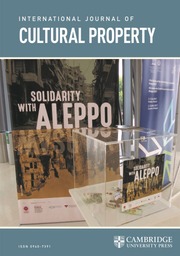Article contents
State Support for Audiovisual Products in the World Trade Organization: Protectionism or Cultural Policy?
Published online by Cambridge University Press: 30 January 2007
Abstract
The failure to agree on the treatment of audiovisual products in the Uruguay Round led to an unsatisfactory result for all World Trade Organization (WTO) members. Yet a balanced evaluation of the arguments on both sides demonstrates that the stalemate need not continue indefinitely. The audiovisual industry is a business, but audiovisual products have cultural features that distinguish them from other tradeable goods and services. If members see local audiovisual products as a means of communication among their people, or if they do not wish to stifle creativity, free speech, or the progressive development of culture, they may need to support local audiovisual products in a manner that discriminates expressly against foreign products. The same cannot be said of discrimination between foreign audiovisual products. If a member wishes to extend benefits to audiovisual products from countries with cultures similar to its own, it can do so by adopting objective criteria, such as language to distinguish between the relevant products. Cultural policy measures in relation to audiovisual products should be the least trade-restrictive necessary to achieve their objectives.ACKNOWLEDGEMENTS: For helpful comments on an earlier version of this article, I thank Dr. Roger O'Keefe, Justin Fung, Alison Lam, Dr. Andrew Mitchell, Matthew Stilwell, and anonymous referees. All errors and omissions, as well as the opinions expressed here, are mine.
- Type
- Research Article
- Information
- Copyright
- © 2006 International Cultural Property Society
References
- 3
- Cited by




